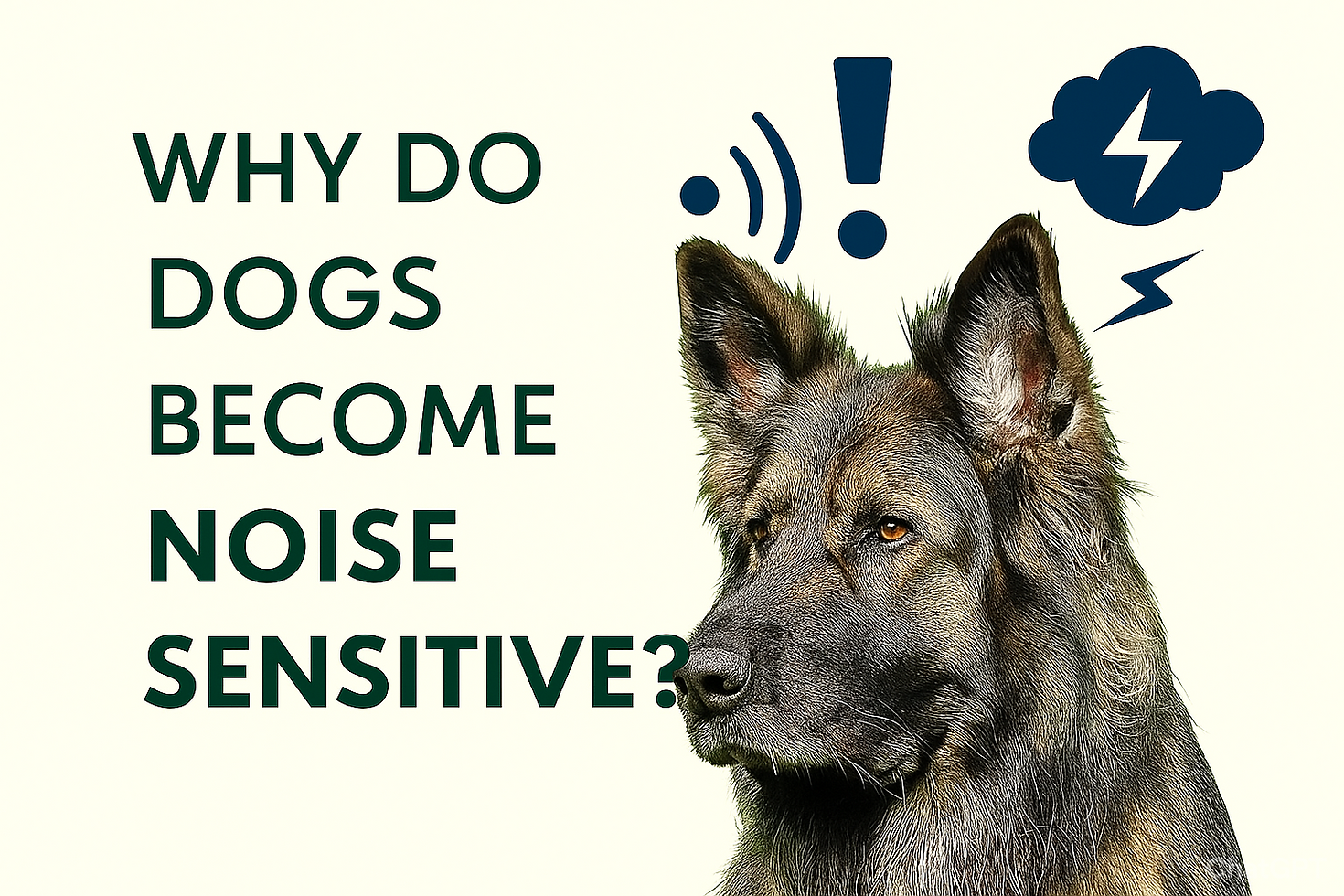
When Sounds Become Scary: Understanding Noise Sensitivity in Older and Ailing Dogs
- karynjayneallen
- Sep 15
- 4 min read
As our dogs grow older, their needs and behaviors can shift in subtle—and sometimes surprising—ways. One common but often misunderstood change in aging dogs is increased sensitivity to noise. Whether it's fireworks, thunder, the beep of a microwave, or even a doorbell, sounds that once barely registered may now trigger stress, fear, or even panic.
This isn’t just about getting old. Dogs dealing with physical illness, chronic pain, or reduced mobility may also begin to show new or heightened reactions to noise. These reactions can be confusing for owners, especially if the dog was always calm and easygoing in the past. But there’s a reason behind the shift—and ways we can help them feel safe again.
Why Do Older or Sick Dogs Become Noise Sensitive?
Just like people, dogs become more vulnerable as they age or deal with health challenges. And with vulnerability comes a heightened sense of self-protection. This is what we are now seeing with Arnhem as ge becomes more physically vulnerable.
1. Physical Decline and Vulnerability
Dogs experiencing joint pain, arthritis, or illness may feel less physically capable of escaping or defending themselves. Loud or sudden noises can now seem more threatening because they can’t react the way they used to. That beeping smoke alarm isn’t just annoying anymore—it feels dangerous.
2. Cognitive Changes
Older dogs are also at risk for Canine Cognitive Dysfunction (CCD), a condition similar to dementia in humans. CCD can affect memory, awareness, and the ability to process what’s happening around them. Noise can be disorienting, even terrifying, if their brain no longer interprets it correctly. We saw these changes with our elderly spaniel, Alfie, who needed a Thunder Buddy in his later years.
3. Hearing Changes
Ironically, hearing loss in aging dogs can contribute to noise sensitivity. As their ability to hear high frequencies declines, their remaining hearing may become more attuned to certain low, startling sounds. Or, because their world has become quieter overall, sudden noises feel more jarring. Backing onto a vintage steam rail line, we see Arnhem reacting only to certain engines now.
4. General Anxiety from Pain or Illness
Dogs that are unwell or in pain often experience higher levels of baseline anxiety. This makes them more reactive to anything unexpected, including sound. What looks like "odd behavior" may actually be a reasonable response from a dog who feels unsafe or vulnerable.
How Noise Sensitivity Can Show Up?
Even if your dog never had an issue with sound before, these behaviors might start to appear:
• Hiding (under beds, in closets)
• Pacing or restlessness
• Trembling or panting
• Clinginess or seeking comfort
• Barking, whining, or howling
• Sudden aggression or defensiveness
• Refusal to eat during noisy times
• Accidents in the house
These signs aren’t “bad behavior”—they’re communication. Your dog is trying to say, “I’m not okay.”
How You Can Help?
You can’t stop every sound in the world, but you can help your dog feel safer and less overwhelmed. Here’s how:
1. Create a Safe Zone
Set up a quiet, cozy retreat with soft bedding, dim lighting, and sound-dampening elements (like curtains or blankets). This becomes their “den” during stressful times.
2. Use White Noise or Calming Music
Soothing background noise can help mask disturbing sounds. Try white noise machines, fans, or dog-specific calming music (like Through a Dog’s Ear).
3. Support Their Body
If your dog is in pain or struggling with mobility, talk to your vet about supportive treatments. Pain management, physical therapy, or joint supplements can all reduce their overall anxiety level and improve their resilience to stress.
4. Calming Products
There are a range of natural and pharmaceutical options that can help reduce anxiety:
• Calming pheromone diffusers (like Adaptil)
• Anxiety wraps or thundershirts
• Natural remedies such as Valerian extract
• Vet-approved supplements (L-theanine, CBD, etc.)
• Prescription anxiety medication if needed
Always consult your veterinarian before starting new treatments.
5. Stay Calm and Reassuring
Your dog will take cues from you. Stay relaxed, speak in a soothing voice, and don’t scold or try to force them to "get over it." Offer comfort, but don’t overreact—it helps to be a calm, stable presence.
When to Seek Professional Help?
If your dog’s noise sensitivity is severe or worsening, don’t wait. A veterinarian can rule out medical causes and may refer you to a veterinary behaviorist or certified dog trainer with experience in anxiety-related issues.
The earlier you intervene, the better the outcome for both your dog and your household.
Final Thoughts: Compassion Above All
It can be heartbreaking to watch your once-bold companion become nervous, jumpy, or withdrawn. But remember: this is not their fault—and it's not yours either. Noise sensitivity in older or ailing dogs is a natural result of feeling vulnerable in a world that no longer feels as predictable or safe.
What they need most is your understanding, patience, and gentle support. By recognizing the signs and taking simple steps to help, you can make a big difference in your dog’s comfort and quality of life.
After all, they’ve spent a lifetime being there for you. Now it’s your turn to be their safe place.









